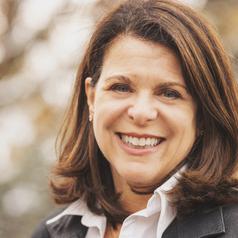
Lynn Greenky
Associate Professor of Communication and Rhetorical Studies, Syracuse University
I am an attorney admitted to practice in New York State. I earned a Bachelor of Science and a Master of Arts in Communication Studies from Northwestern University. I have authored a book: When Freedom Speaks: The Boundaries and the Boundlessness of our First Amendment Right, published by Brandeis University Press and available for purchase on Amazon and other online outlets. My interests are in advocacy, argumentation, political communication, and first amendment jurisprudence. I have developed courses at Syracuse University that reflect those interests. I have been published in the Washington Post, The Hill, and Ms. Magazine and have participated in several podcasts, online lectures, and radio broadcasts. For more information, please visit https://lynngreenky.com/.
Less ![]()
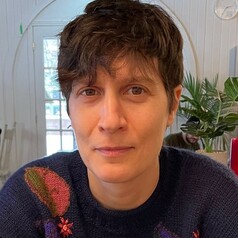
Lynn Kozak
Associate professor, History and Classical Studies, McGill University
Lynn Kozak has translated, directed, produced, and performed in numerous professional and student productions of ancient Greek and Latin epic and tragedy. Other research focuses on ancient Greek literature, classical receptions, and contemporary media studies, with particular interests in horror and television.
Less ![]()

Lynn Meskell
PIK Professor of Anthropology; Professor of Historic Preservation, Weitzman School of Design, Penn Museum, University of Pennsylvania
Lynn Meskell is Penn Integrates Knowledge (PIK) Professor at the University of Pennsylvania. She is Richard D. Green Professor of Anthropology in the School of Arts and Sciences, Professor in the Graduate Program in Historic Preservation at the Weitzman School of Design, and curator in the Middle East and Asia sections at the Penn Museum. Currently she serves as AD White Professor-at-Large at Cornell University (2019-2025). She holds Honorary Professorships at Oxford University and Liverpool University in the UK, Shiv Nadar in India and the University of the Witwatersrand, South Africa.
Over the last decade Lynn has conducted an institutional ethnography of UNESCO World Heritage, tracing the politics of governance and sovereignty and the subsequent implications for multilateral diplomacy, international conservation, and heritage rights. Employing archival and ethnographic analysis, her award-winning book A Future in Ruins: UNESCO, World Heritage, and the Dream of Peace (OUP, 2018) reveals UNESCO’s early forays into a one-world archaeology and its later commitments to global heritage. Building on this research, she is currently examining the entwined histories of colonialism, internationalism, espionage and archaeology in the Middle East coupled with a new project on the heritage security nexus at NATO. Her other fieldwork explores monumental regimes of research and preservation around World Heritage sites in India and how diverse actors and agencies address the needs of living communities.
Less ![]()
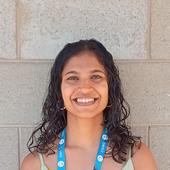

Lynnaire Sheridan
Senior lecturer, University of Otago
Lynnaire Sheridan is a senior lecturer in HR and Management at the University of Otago.
Her educational research focuses on work integrated learning, academic integrity and widening participation through indigenising the curriculum. Her HR / management scholarship focuses on enhancing the employment outcomes of people with disabilities, understanding burnout and striving for business sustainability.
Less ![]()

Lynne Chepulis
Associate Professor Health Sciences, University of Waikato
PhD health sciences (2008)
currently lead a number of large HRC-funded studies in primary healthcare and chronic disease (with equity focus)
executive board member of NZ Society for Study of Diabetes
associate member Royal Society of Medicine
Less ![]()
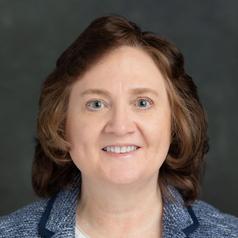
Lynne Parker
Associate Vice Chancellor, University of Tennessee
Lynne E. Parker, a native Knoxvillian, is Associate Vice Chancellor at the University of Tennessee, Knoxville (UTK), and Director of the AI Tennessee Initiative, which is positioning the University and the state of Tennessee as a national and global leader in the data-intensive knowledge economy. Prior to this role, she led national artificial intelligence (AI) policy efforts for four years (2018-2022) in the White House Office of Science and Technology Policy, serving as Deputy Chief Technology Officer of the United States, Founding Director of the National AI Initiative Office, and Assistant Director for AI. She also served as co-chair of the Congressionally-directed National AI Research Resource Task Force, which is working to democratize access to the computational and data infrastructure needed for AI research. She served for two years (2015-2016) at the National Science Foundation as Division Director for Information and Intelligent Systems. In these roles across three Administrations, she led the development of numerous landmark national AI policies bolstering research, governance, education and workforce training, international engagement, and the Federal use of AI.
Dr. Parker joined the UTK faculty in 2002 and is an expert on distributed and intelligent robot systems, human-robot interaction, and AI, having published extensively in these and related areas. She previously worked for several years as a Distinguished Research and Development Staff Member and Group Leader at Oak Ridge National Laboratory, researching multi-robot and human-robot systems. Dr. Parker has served on many government advisory boards, including the National Academies' Intelligence Science and Technology Experts Group (ISTEG), National Research Council's (NRC) committee on persistent surveillance for the counter-IED mission, NRC Panel for Review of the Engineering Laboratory at the National Institute of Standards and Technology (NIST), NRC Panel on Mechanical Science and Engineering at the Army Research Laboratory (ARL), NRC Advisory Panel on Information Science at ARL, NRC Advisory Panel on Air and Ground Vehicle Technology at ARL, and NRC Advisory Panel on Armor and Armaments at ARL. Dr. Parker was also a member of the 2004-2005 class of the Defense Science Study Group (DSSG).
She has received numerous awards for research, teaching, and service, including the U.S. Presidential Early Career Award for Scientists and Engineers (PECASE) and the IEEE (Institute of Electrical and Electronics Engineers) Robotics and Automation Society’s George Saridis Leadership Award in Robotics and Automation. She is a Fellow of AAAI (Association for the Advancement of Artificial Intelligence), AAAS (American Association for the Advancement of Science), and IEEE; and a Distinguished Member of ACM (Association for Computing Machinery). Dr. Parker earned a B.S. from Tennessee Technological University, an M.S. from the University of Tennessee, and a Ph.D. from the Massachusetts Institute of Technology, all in computer science.
Less ![]()
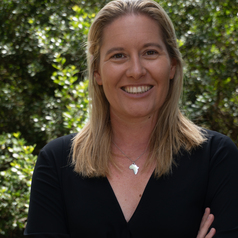
Lynne Quick
Senior Research Fellow, Nelson Mandela University
I am a Senior Research Fellow associated with the African Centre for Coastal Palaeoscience (ACCP) at Nelson Mandela University in South Africa. I am a palaeoecologist, specifically a palynologist who runs the Palaeoecology Laboratory (“Palaeolab”) at the university’s Gqeberha campus (Eastern Cape). My research relates to reconstructing southern African palaeoenvironments, with a key focus on the vegetation history and past climate dynamics of the highly biodiverse Cape Floristic Region.
Less ![]()

Lynsey Melville
Professor of Environmental Engineering in the Faculty of Computing Engineering and Built Environment, Birmingham City University
Dr. Lynsey Melville is Professor of Environmental Engineering at Birmingham City University, where she leads the Global Environmental Challenges Research Group. As a transdisciplinary researcher her work focuses on the interrelationships between water, energy, waste, and agriculture.
Dr. Melville has worked on multiple collaborative projects across the world, employing participatory approaches that place communities at the heart of sustainable solutions. Her vision is to build resilient communities by applying innovative engineering strategies that transforms waste into valuable resources.
Her expertise spans water and wastewater treatment, bioresource management and bioenergy production.
Dr. Melville is a passionate advocate for women in STEM and higher education, championing diversity through initiatives like WISE and Athena Swan
Less ![]()
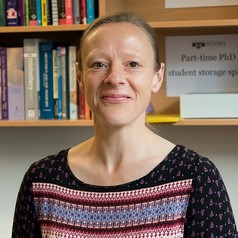
Lynsey Sutton
Teaching Fellow/Clinical nurse specialist, Victoria University of Wellington
I graduated as a nurse in 1996 from the University of Nottingham and have worked in the Intensive care specialist area all my career. I have worked in Wellington ICU since 2004 where I have progressed through the career pathway to Expert level and worked briefly as an ICU flight retrieval nurse. In 2012 I graduated from Victoria University of Wellington with a Masters in clinical nursing. From 2009 I became an Associate Charge Nurse Manager (ACNM) managing and coordinating ICU services. Through these years I have led several projects improving the quality of patient care in the ICU and have published in several critical care journals. For the past 4 years I have been a guest lecturer going on to become a teaching fellow with Victoria University of Wellington post graduate Nursing programme as well as being the Clinical Nurse Specialist in Wellington ICU.
Less ![]()

Lynzi Armstrong
Senior Lecturer in Criminology, Te Herenga Waka — Victoria University of Wellington
Dr Lynzi Armstrong is a Senior Lecturer in Criminology at Victoria University of Wellington, New Zealand. Her research interests include sex worker rights, sex work laws, stigma, sexual violence, anti-trafficking policy, and social harm.
Less ![]()
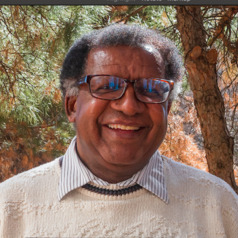
Lyombe Eko
Professor of Journalism and Creative Media Industries, Texas Tech University
Lyombe Eko is a professor in the College of Media and Communication, Texas Tech University. His areas of research and teaching expertise are comparative and international communication studies, with an emphasis on Francophone and Anglophone Africa; comparative information and communication technology law and policy, with a focus on the European Union, the United States, France and the UK. He also studies visual communication (cartoons), human Rights, and freedom of expression. He has published four books, including the award-winning, The Charlie Hebdo Affair and Comparative Journalistic Cultures: Human Rights Versus Religious Rites (Palgrave Macmillan 2019), and New Media Old Regimes: Case Studies in Comparative Communication Law and Policy (2012); and The Regulation of Sex-themed Visual Imagery: From Clay Tablets to Tablet Computers (2016). He has also published numerous, widely cited articles in law review journals and refereed visual and international communication journals.
Before he joined Texas Tech in 2015, he was an associate professor at the University of Iowa School of Journalism and Mass Communication. He was also Director of the African Studies Program at the University of Iowa. He has also taught at the University of Maine, Orono, Maine. He earned his PhD in Journalism from Southern Illinois University at Carbondale. Before his academic career, he was a journalist at Cameroon Radio and Television (CRTV), and an editor/translator and producer at the African Broadcasting Union (URTNA) in Nairobi, Kenya.
Less ![]()
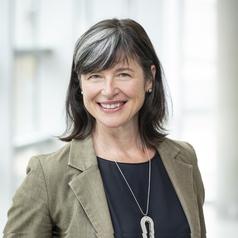
Lysanne Lessard
Associate Professor, Telfer School of Management, L’Université d’Ottawa/University of Ottawa
I received a Ph.D. in Information Systems from the University of Toronto's Faculty of Information. I also hold a Master's degree in Information Technology (M.Sc.) from Téluq - Université du Québec à Montréal (UQAM). While my primary funding agency is NSERC, I also hold grants from CIHR and SSHRC.
My research aims at improving how we design digitally enabled services like telehealth so that they can better address human needs. My research program focuses on three key aspects of the design of digitally enabled services: the need for improved models and modeling techniques supporting the analysis and design of these systems; the need to articulate their sociotechnical architectures; and the need to anchor the design of the information and communication technologies (ICTs) embedded in these systems both in relevant theories and in a deep understanding of multiple stakeholder needs. I investigate these aspects in the health care domain, with a particular interest on how they can support the transformation of health systems.
I am a member of the LIFE Institute and of the Institut du Savoir Montfort.
Less ![]()
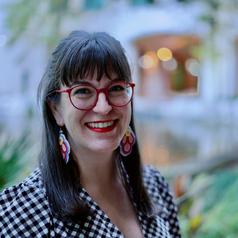
M J C Warren
Senior Lecturer in Biblical and Religious Studies, University of Sheffield
I am a Senior Lecturer at the University of Sheffield, where I am the Director of the Sheffield Centre for Interdisciplinary Biblical Studies. In addition, I am editor in chief of the open-access Journal for Interdisciplinary Biblical Studies.
I have published numerous books and articles on early Christianity, early Judaism, and biblical texts. Most recently, I published a co-authored text book with Sara Parks and Shayna Sheinfeld titled Jewish and Christian Women in the Ancient Mediterranean (Routledge 2022). I have two previous mongraphs. Food and Transformation in Ancient Mediterranean Literature (SBL, 2019) defines a genre of transformative ingestion called hierophagy. I use sensory analysis to explore how performative consumption brings about access to other worlds in ancient Mediterranean narratives. My first book, My Flesh is Meat Indeed (Fortress; 2015), evaluates how John 6:51c–58 contributes to the gospel’s presentation of Jesus as divine in light of Hellenistic attitudes about sacrifice, divinity, and the consumption of human flesh. Soon to be published are two co-edited volumes on Judeophobia and the New Testament (Eerdmans 2025) and on Good Omens and the Bible (Sheffield Phoenix 2025).
Less ![]()
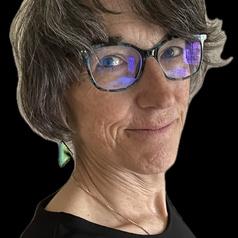
M Michelle Gallant
Professor, Faculty of Law, University of Manitoba
Research in tax law and policy, philanthropy and law (charities), money laundering, proceeds of crime and civil forfeiture law. Teaching interests include tax law and policy, philanthropy and tainted finance.
Less ![]()
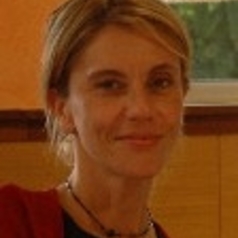
M. Angeles Lopez Cabarcos
Profesora del Departamento de Organizaciónd de Empresas. Universidad de Santiago de Compostela, España, Universidade de Santiago de Compostela
Professor with Tenure at Santiago de Compostela University - Spain (Department of Business Administration), A Coruña University - Spain, and Universitát Oberta de Catalunya - Spain.
Her research interests are focused on different lines of research focused all of them on corporate social responsibility, such as strategic management of human resources, innovation, technology, or natural resources management.
Less ![]()
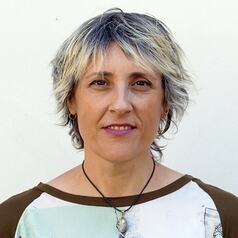
M. Ángeles Serrano
ICREA Research Professor of Complexity Science, Universitat de Barcelona
M. Ángeles Serrano is an ICREA Research Professor at the Dept. of Condensed Matter Physics of the University of Barcelona (UB) in Spain, where she directs the Mapping Complexity Lab, and holds an appointment as an External Faculty at the Complexity Science Hub CSH Vienna in Austria. M. Ángeles belongs to the Editorial Board of the APS journal Physical Review Research, and she is a founding member of Complexitat, the Catalan network for the study of complex systems, and a promoter member of UBICS, the UB Institute of Complex Systems.
A native of Barcelona, she received a Ph.D. in theoretical physics from UB and a year later a master in mathematics for finance from the Centre de Recerca Matemàtica CRM. She spent several years in the private sector and returned to academia to work in complexity science. She conducted postdoctoral research at Indiana University (USA), the EPFL (Switzerland), and IFISC Institute (Spain), and was awarded a Ramón y Cajal Fellowship.
Prof. Serrano is astonished by the amazing features that emerge in the structure, function, and evolution of complex systems, and she is using networks and data science to model and to predict them.
Less ![]()
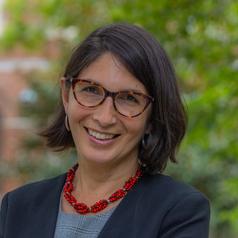
M. Cristina Alcalde
Vice President for Transformational and Inclusive Excellence, Miami University
M. Cristina Alcalde is Vice President for Transformational and Inclusive Excellence at Miami University. She also holds an appointment as professor of global and intercultural studies. In her VP role, she provides strategic vision and leadership for a holistic, coordinated approach to inclusive excellence for faculty, staff, and students.
Before joining Miami, she served as associate dean of inclusion and internationalization in the College of Arts and Sciences and as Marie Rich Endowed Professor in gender and women’s studies at the University of Kentucky, where she also designed and directed the Online Graduate Certificate in Diversity and Inclusion. As a scholar-practitioner, she has published widely and speaks nationally and internationally on inclusion, race and racialization, gender violence, migration, exclusion, belonging, and leadership.
In addition to dozens of journal articles and chapters, her books include Dismantling Institutional Whiteness: Emerging Forms of Leadership in Higher Education (2022); #MeToo and Beyond: Perspectives on a Global Movement (2022); Familia, exclusión y racismo de la peruanidad: la tía Eliana (2022); Peruvian Lives across Borders: Power, Exclusion, and Home (2018); Provocations: A Transnational Reader in the History of Feminist Thought (2015); La mujer en la violencia (2014); and The Woman in the Violence: Gender, Poverty, and Resistance in Peru (2010). Recent shorter pieces on women in leadership positions, re-envisioning leadership in higher ed, and women of color and burnout have appeared in Inside Higher Ed and Ms. Magazine. She is co-editor of the Navigating Careers in Higher Ed Book Series, Editorial Board Member of the Political and Legal Anthropology Review, and Editorial Board Member of Insight into Diversity. In 2024, she was named as one of the Top 50 Women Leaders of Ohio by Women We Admire.
Education
Ph.D., Indiana University
Less ![]()
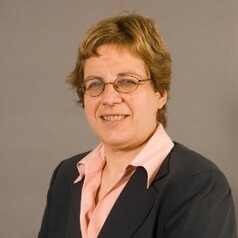
M. Dolores Cimini
Director for Behavioral Health Promotion and Applied Research, University at Albany, State University of New York
Dolores Cimini is a New York State licensed psychologist who has provided leadership since 1982 on a number of federal, state, and private grant-funded programs. She is currently the project director for more than $2.8 million in federal grants addressing high-risk drinking and other prevention issues, including a grant under the NIAAA Rapid Response to College Drinking Problems program and the SAMHSA Campus-Based Targeted Capacity Enhancement Grant for Alcohol Screening and Brief Intervention for students seeking health care through the University.
Cimini has also served as project director for two U.S. Department of Education grant projects, including the Alcohol and Drug Prevention Model Programs Grant. She is the director of the Middle Earth Peer Assistance Program at UAlbany, an agency recognized as a model/exemplary program in alcohol abuse prevention by both the U.S. Department of Education and the Center for Substance Abuse Prevention, U.S. Department of Health and Human Services. She has published professional articles in both national and international refereed journals in the alcohol and substance abuse field.
Less ![]()
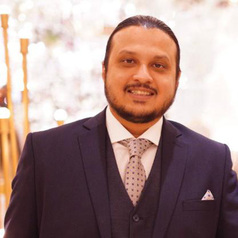
M. Fahad Humayun
Assistant Professor of Communication, University of Evansville
Dr. Fahad Humayun is a journalism researcher and educator who earned his PhD in Media Research and Practice from University of Colorado Boulder. His research has been published in prestigious journals such as Digital Journalism and Journalism Practice and he is also a recipient of research awards from International Communication Association (ICA) and Association for Education in Mass Communication and Journalism (AEJMC). He has taught journalism at multiple universities and brings experience of teaching both undergrad and graduate students.
Dr. Humayun is an avid sports fan and as a child he used to stay up all night to watch NBA games while living in Pakistan.
Less ![]()
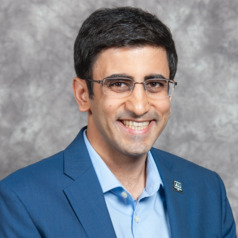
M. Hadi Amini
Assistant Professor of Computing and Information Sciences, Florida International University
M. Hadi Amini is an Assistant Professor at the Knight Foundation School of Computing and Information Sciences at the College of Engineering and Computing, Florida International University (FIU). He is the founding director of Sustainability, Optimization, and Learning for InterDependent networks laboratory (www.solidlab.network), director of the ADvanced education and research for Machine learning-driven critical Infrastructure REsilience (ADMIRE) Center (funded by the US DHS), and Associate Director of the US DOT Transportation Center for Cybersecurity and Resiliency (TraCR). He received his Ph.D. in Electrical and Computer Engineering from Carnegie Mellon University in 2019, where he received his M.Sc. degree in 2015. He also holds a doctoral degree in Computer Science and Technology. Since founding solid lab, his research on advanced machine learning algorithms/optimization and their applications has been extensively funded by various federal and state agencies, with a total funding of $4.7M ($2.92M as PI and $1.78M as Co-PI).
His research interests include distributed machine learning/optimization algorithms, federated learning, interdependent networks, and cyber-physical-social resilience and cybersecurity. Application domains include smart cities, intelligent transportation systems, healthcare, and energy systems. Hadi is a Senior Member of IEEE, and a life member of IEEE-Eta Kappa Nu (IEEE-HKN), the honor society of IEEE. He served as President of Carnegie Mellon University Energy Science and Innovation Club; as a technical program committee of several IEEE and ACM conferences; and as the lead editor for a book series on ‘‘Sustainable Interdependent Networks’’ since 2017. He also serves as Associate Editor of Data Science for Communications (Frontiers in Communications and Networks). He has published more than 150 refereed journal and conference papers, and book chapters. He edited/authored eight books. He is the co-recipient of the best paper award from “2019 IEEE Conference on Computational Science & Computational Intelligence”, 2021 best journal paper award from “Springer Nature Operations Research Forum Journal”, the Excellence in Teaching Award from FIU School of Computing and Information Sciences in 2020, 2023 Faculty Senate Excellence in Teaching Award from the Office of Faculty Leadership and Success at Florida International University, best reviewer award from four IEEE Transactions, the best journal paper award in “Journal of Modern Power Systems and Clean Energy”, and the dean’s honorary award from the President of Sharif University of Technology.
Less ![]()
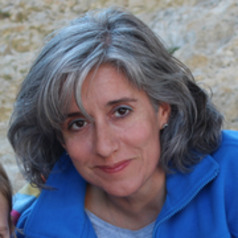
M. Julia Suso López
Dra. en Matemáticas especialidad Astronomía, Universitat de València
Julia Suso es doctora en Matemáticas especialidad Astronomía por la Universidad de Valencia. Es miembro adscrito del Observatorio Astronómico de la Universidad de Valencia del que ha sido durante 4 años jefa de instrumentación astronómica. Es profesora titular en el Departamento de Economía Financiera y Actuarial de la Facultad de Economía.
Ha participado en diversos proyectos espaciales, con colaboraciones en el diseño y el desarrollo de las misiones de rayos gamma INTEGRAL de la ESA y LEGRI a bordo del satélite Minisat 01.
Actualmente trabaja en el estudio de la naturaleza y los parámetros físicos de las estrellas Be y de las binarias transitorias de rayos X. También ha trabajado con las misiones espaciales CoRoT (CNES/ESA) y KEPLER (NASA), dedicadas a la astrosismología y a la búsqueda de planetas extra solares.
Ha realizado observaciones astronómicas en los principales observatorios astronómicos de todo el mundo (Chile -La Silla, Canarias Observatorio del Teide y Roque de los Muchachos, Sudáfrica – SAAO, Almería -Calar Alto, Canadá -DDO).
Less ![]()
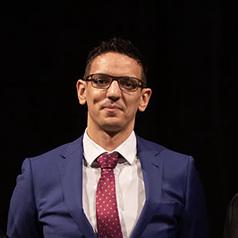
M. Muhannad Ayyash
Professor, Sociology, Mount Royal University
Muhannad Ayyash is Professor of Sociology at Mount Royal University. He is the author of A Hermeneutics of Violence (UTP, 2019). He teaches and writes in the areas of decolonial theory, political violence, sovereignty, anti-Palestinian racism, and Palestinian social movements. He has published several academic articles, book chapters, and has two co-edited books. His opinion pieces have been published in Al-Jazeera, The Baffler, Middle East Eye, and Mondoweiss, among others.
Less ![]()
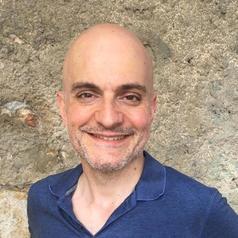
M. Rodwan Abouharb
Associate Professor in International Relations, UCL
I am originally from Cardiff in South Wales of British and Syrian heritage. My undergraduate degree is in Politics and Modern History from Brunel University. I have researched for an MP in the House of Commons, and a U.S. Senator in the United State Senate in Washington, D.C. I received my M.A. in Political Science from University at Buffalo and my PhD in Political Science from Binghamton University. I previously worked in the Department of Political Science at Louisiana State University in Baton Rouge, Louisiana.
My research examines the determinants and consequences of human rights violations.
Less ![]()
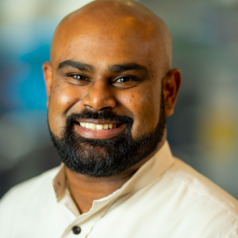
M. Sudhir Selvaraj
Lecturer in International Development, University of Bradford
Dr M. Sudhir Selvaraj is a Lecturer in the Department of Peace Studies and International Development, University of Bradford. He earned his PhD in Politics from the King's India Institute and his MA in International Relations (with distinction) from the Department of War Studies, both at King's College London. Before joining PSID, he worked as a Lecturer in International Development at the Department of International Development, King's College London, where he continues to serve as a research affiliate. His research explores religious politics in India.
Sudhir is also a seasoned theatre person who brings many creative practices into his teaching. He has written plays on conflicts in South Asia.
Less ![]()
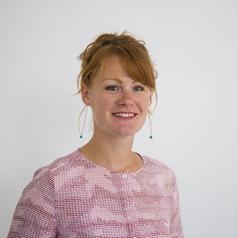
Maarja Lühiste
Reader in Comparative Politics & Gender, Newcastle University
Maarja Lühiste is Reader in Comparative Politics & Gender in Newcastle University and Editor of Representation. Maarja's research interests include gender and political communication, participation and engagement; political representation; electoral systems; European Parliament elections; and quantitative research methods.
Less ![]()
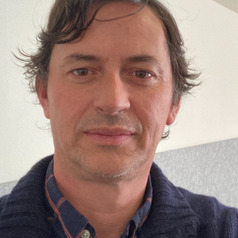
Maarten de Laat
Professor of Augmented and Networked Learning, Director Centre for Change and Complexity in Learning (C3L), Academic Lead AI for LIFE CRC bid development, Education Futures, University of South Australia
Maarten de Laat is professor in Augmented and Networked Learning and co-director of the Centre for Change and Complexity in Learning (C3L) at the University of South Australia. His research focuses on learning and value creation in social networks. He uses practice-based research methodologies to study the impact technology, AI, learning analytics and social design has on the way social networks and communities work, learn and innovate. Maarten is co-chair of the international Networked Learning Conference, editor of the Springer book series on Research in Networked Learning, and Research Lead for the AI for Learning Innovation and Future Education (AI for LIFE) CRC bid development.
Less ![]()

Maartje Weerdesteijn
Assistant Professor, Vrije Universiteit Amsterdam
Maartje Weerdesteijn is Assistant Professor at the Department of Criminal Law and Criminology and researcher at the Center for International Criminal Justice. Maartje obtained a PhD from Tilburg University, Department of Criminal Law, a Master's in International Crimes and Criminology from VU Amsterdam (Cum Laude), and a Bachelor in European Studies (Cum Laude). She used to work as a lecturer at the History of International Relations Department of Utrecht University and was a visiting scholar with Griffith University Australia at the Griffith Asia Institute in 2014. She is an interdisciplinary scholar, combining a historical and criminological outlook. She focuses on the role of dictators in the perpetration of mass atrocities and the manner in which the international community can potentially mitigate these crimes.
Less ![]()

MaCalus V. Hogan
Professor and Chair of Orthopedic Surgery, University of Pittsburgh
Dr. Hogan is the David Silver Professor and Chair of the Department of Orthopaedic Surgery at the University of Pittsburgh School of Medicine and Chief of Orthopaedic Surgery for UPMC. With secondary appointments in the Department of Bioengineering and the Katz School of Business. Dr. Hogan was the founder and director of the Foot and Ankle Injury Research (F.A.I.R.) group at Pitt, within the Department of Orthopaedic Surgery. He serves as a foot and ankle consultant for the athletic departments at the University of Pittsburgh, Carnegie Mellon University, Duquesne University, and Robert Morris University. He is the assistant team physician for Point Park University, including the Conservatory of Performing Arts, and the Pittsburgh Ballet Theatre. Dr. Hogan also serves as the foot and ankle consultant for the Pittsburgh Steelers and Pittsburgh Penguins as part of UPMC Sports Medicine.
Originally from Muscle Shoals, Alabama, Dr. Hogan completed his undergraduate studies at Xavier University of Louisiana with a bachelor of science degree in biochemistry and minor in biology. He received his medical degree from Howard University College of Medicine in Washington, DC, and completed his orthopaedic surgery residency at the University of Virginia Health System in Charlottesville, Virginia, which included a National Institutes of Health Clinician Scientist fellowship year with a focus in musculoskeletal tissue repair and regeneration. He completed his foot and ankle fellowship at the Hospital for Special Surgery in New York, where he served as a consultant for the New York Ballet Company, American Ballet Theatre, and several collegiate and professional sports teams.
Certified by the American Board of Orthopaedic Surgery, Dr. Hogan is a member of the American Academy of Orthopaedic Surgeons, the American Orthopaedic Association, the American Orthopaedic Foot & Ankle Society Foundation Board of Directors, the Orthopaedic Research Society, the J. Robert Gladden Orthopaedic Society, and the International Society for Arthroscopy, Knee, and Orthopaedic Sports Medicine. Dr. Hogan has over 250 manuscripts, book chapters, and presentations. Dr. Hogan presents both nationally and internationally on his management of foot and ankle injuries, regenerative medicine, and his clinical outcomes research. Dr. Hogan has been selected as a Best Doctor in America since 2016 and serves on the Hall of Fame Health Medical Advisory Board.
Less ![]()
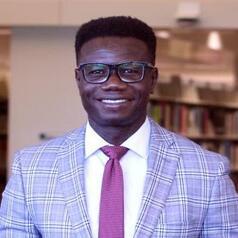
Macarius Mwinisungee Donneyong
Assistant Professor of Pharmacoepidemiology, The Ohio State University
My research focuses on the safety and effectiveness of medications and medical devices. Specifically, I apply quantitative methods from epidemiology, pharmacoepidemiology, biostatistics and data analytics to analyze large healthcare databases such as health insurance claims and other linked databases which capture prescribed medication use and outcomes on their safety and effectiveness. Currently, I focus specifically on:
1. The role of the social determinants of health factors on the effectiveness of prescribed medications: He is interested in how the conditions in which people are born, grow, live, work and age influence the safety and effectiveness of prescribed medication use in the community settings.
2. Medication outcomes among racial/ethnic minorities: Through population-based observational studies, he tries to measure differences in the utilization, safety and effectiveness of prescribed medications between racial groups, as racial/ethnic minority groups tend to be under-represented in clinical trials of drugs.
3. Drug-drug interactions: The simultaneous use of multiple medications is growing increasingly common. He investigates whether it is safe to simultaneously use certain medications or not.
Less ![]()
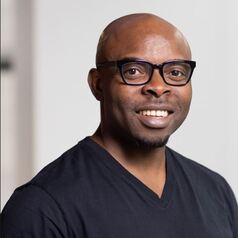
MacDonald Oguike
PhD Candidate in Economics and Business Administration, University of Vaasa
MacDonald is a Doctoral Degree (PhD) Candidate in Economics and Business Administration at the University of Vaasa, Finland. His qualifications include an M.A. in Education Management and a Bachelor of Arts in English Language. He also holds certificates in Business Analysis and Project Management. He is currently the Director of Corporate Training and Workforce Development at the Department of Continuing Education, University of Calgary.
Less ![]()
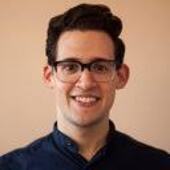
Mackenzie Gamble
Ph.D. Candidate in Molecular and Translational Medicine, Boston University
Less ![]()
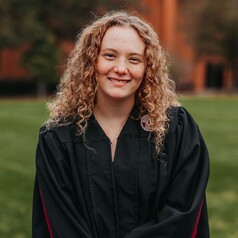
MacKenzie Paul
Doctoral student in psychology, Baylor University
MacKenzie Paul is a PhD student in Baylor University's Social Psychology Program. She received her B.S. in Psychology and B.A. in Philosophy from Mississippi State University in May of 2023. Her primary research interests are at the intersection of psychology and religion, with current projects focusing on the effect of religious music on emotions and relationships, and collaborations between faith leaders and mental health professionals.
Less ![]()

Madalyn J. Mann
PhD Candidate, Department of English and Related Literature, University of York, University of York
Madalyn Mann is an interdisciplinary researcher based in York, England. Her research interests revolve around the intersection of race, gender, politics and education. Madalyn is a PhD candidate at the University of York's Department of English and Related Literature, where her thesis analyzes the United States governments simultaneous weaponization of education against Native American and African American children from 1860-1920. Her practice-based PhD focuses on the different acts of legislation passed to legally prevent African American children from obtaining an education and how similar legislation assisted the United States government in manipulating Native American children's education. Madalyns work also examines the philosophies of education reformists of the period and their efforts.
Madalyn holds a BA (hons) in English Literature from Illinois State University and an MA in English and American Literature from the University of Kent.
Less ![]()
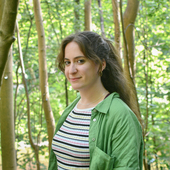
- Market Data























